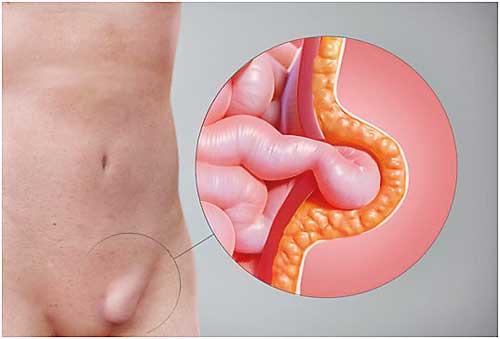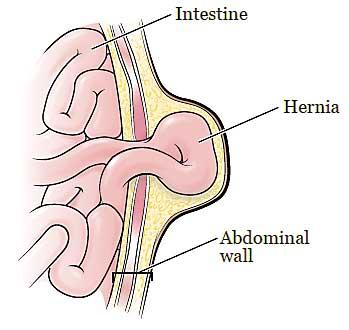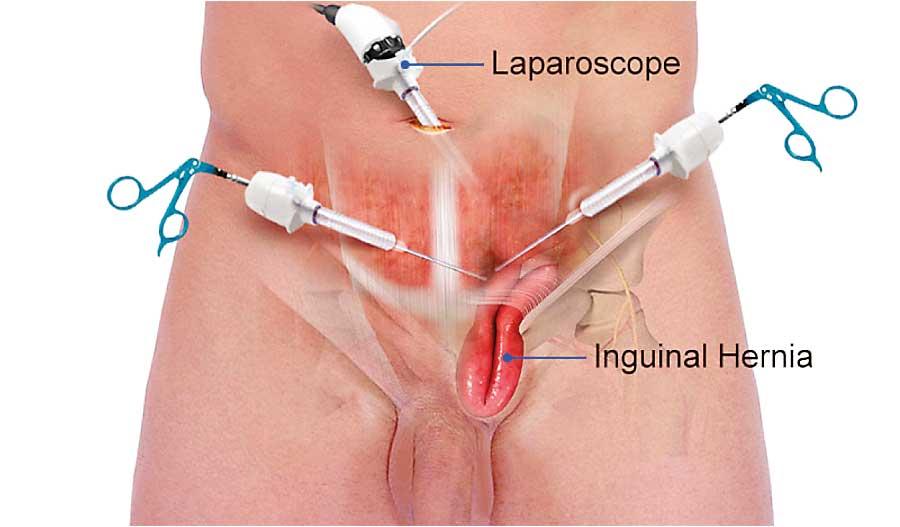23 Aug 2019 - {{hitsCtrl.values.hits}}

 While there are many medical maladies that people face in the world, some diseases often make one stop and wonder how it was caused in the first place. Although many causes for diseases are normally understandable, some causes may seem a bit unusual.
While there are many medical maladies that people face in the world, some diseases often make one stop and wonder how it was caused in the first place. Although many causes for diseases are normally understandable, some causes may seem a bit unusual.
Hernia is one such disease that doesn’t fail to shock people. If one thought that the internal organs of our body remain right where they are, still in one place, performing the usual functions, then this disease might be a shock.
A hernia occurs when an internal organ inside the body pushes through the muscle or tissue that holds it in place. It then forms a localized bulge, most commonly in the abdomen
or groin.
The muscles are usually strong enough to hold the organs in place. However, if they are not able to do so, a hernia is formed.
To explain the seriousness of the disease, the Health Capsule spoke to Doctor Himaru Wirithamulla, Consultant General and Upper GI Surgeon, who shared his remarkable knowledge about the condition.
What Is A Hernia? 
Dr Wirithamulla explained that a hernia is the normal protrusion of the organs or contents inside the body cavity through a weakness of its own. He mentioned that this mostly occurs in the abdominal and groin areas and the contents tend to bulge out of through body walls. This condition which can be inherited and present even at birth, can also be developed in the late stages of life.
According to Dr Wirithamulla, the most common cases are when one is born with it, usually in the groin or belly button. They usually occur at the natural places of weaknesses thus affecting the abdomen and groin.
Causes And Effects Of Hernia
Dr Wirithamulla mentioned that the natural weak areas are the groin and belly button. The organs and contents jut out of these weak areas forming hernias. A hernia can occur naturally or it can be developed after surgery.
Usually, after the surgery is done for a hernia, the wall is repaired. However, the scar that remains is a weak point and this may be a cause for another hernia to develop. This condition is known as “Incisional Hernia”.
Hernias arise when pressure is exerted for a long time period. Elevation of pressure in the affected areas will cause complications.

Dr Wirithamulla stated that the moment a loop of bowel moves through the area or when the blood supply goes through, it can become an issue and lead to
emergency situations.
Dr Wirithamulla also explained that most hernias initially tend to disappear on their own. He mentioned that a night’s rest can help reduce the hernia and cure it.
However, “Irreducible Hernia” can lead to obstruction when bowel blocks the passage. This causes the patient to develop severe (abdominal) pain and discomfort. The patient will not be able to pass the digested food materials and will have to vomit due to blockage. This is known as “Obstructed Hernia”.
Obstructed hernia, if left untreated, may cause “Strangulated Hernia”. Strangulated hernia occurs when the hernia eventually cuts off the blood supply to the intestines and the tissues in the abdomen. This is a very serious stage and may also be fatal.
Symptoms Of A Hernia
There are very few symptoms for the disease. It is usually a swelling or lump in the abdomen or groin that can raise concerns towards it being a hernia.
Dr Wirithamulla stated that the other common symptoms of hernia include pain or discomfort in the affected area (during coughing, bending and lifting), nausea, vomiting and pain in and around the bulge.
Most patients tend to complain about the burning and aching sensation in and around the bulge.
Diagnosis Of A Hernia
A hernia is usually diagnosed clinically by examination and by performing an ‘Ultra Sound Scan’. However, Dr Wirithamulla stated that if the hernia is quite obvious, a scan would be unnecessary.
Treatments And Cure
Dr Wirithamulla stressed the fact that it is very important to treat the patient before the emergency stage arises. He stated that the repair is done surgically as it is a structural deformity issue.
He also said that most patients ask the common question of whether a hernia can be cured by medicine and drugs. However, since it is a surgical problem, a surgery is mandatory to be cured. Although medicine can reduce the pain and avoid the worsening of the hernia, it cannot completely get rid of the disease.
There are two types of surgeries that can be performed for treatment. They are; open surgery and laparoscopic surgery. Dr Wirithamulla explained that laparoscopy is performed by inserting a device into the abdominal cavity to detect the hernia and repair it with the use of a mesh.
Laparoscopy is more advantageous than open surgery due to the minimal cut, less pain and damage, and quick recovery.

22 Dec 2024 12 minute ago
21 Dec 2024 21 Dec 2024
21 Dec 2024 21 Dec 2024
21 Dec 2024 21 Dec 2024
21 Dec 2024 21 Dec 2024